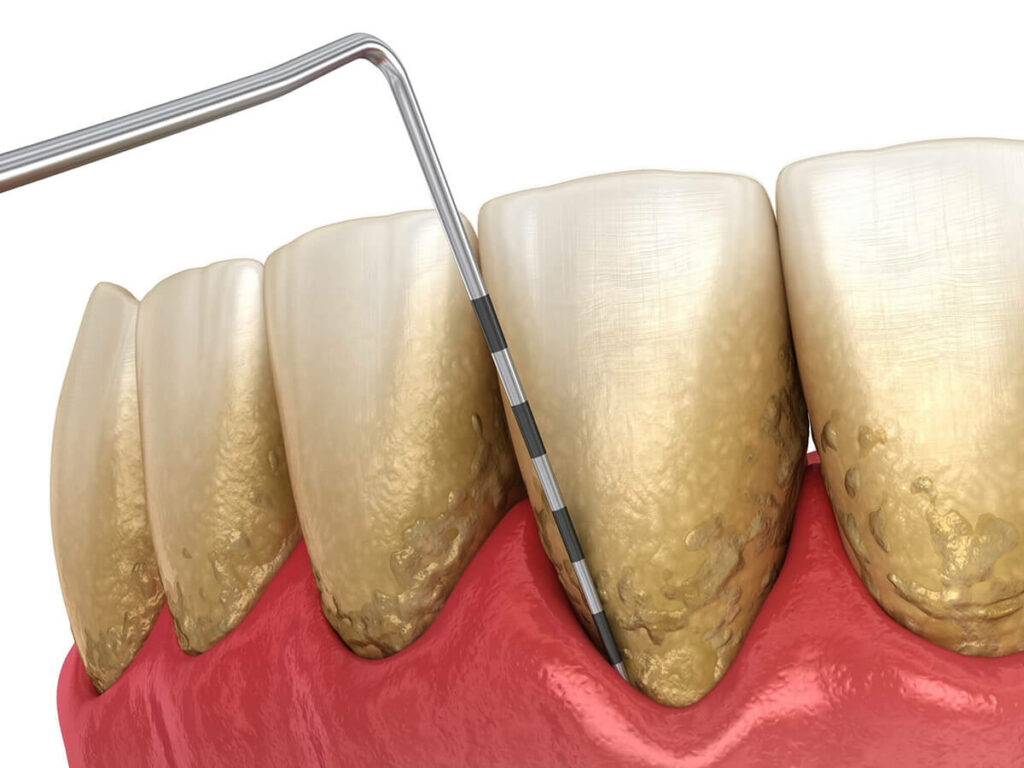Gum Disease (Periodontal Disease)
Gum disease, also known as periodontal disease, is a common condition that affects many of our patients. At Tally Dental Excellence, we offer comprehensive periodontal services to treat all stages of gum disease and support your oral health.
Periodontal Disease Treatment in Allen Park, MI
Our team is dedicated to promptly addressing gum infections to prevent more severe problems. If we detect an issue with your gums, we will address it immediately. We often perform scaling and root planing, a two-step deep cleaning procedure. First, we remove tartar buildup on the roots of your teeth below your gumline. Then, we smooth the surface of the tooth roots to facilitate reattachment to the gums.
Additionally, we can prescribe antibiotics to eliminate any remaining bacteria. If you feel anxious about treatment, we can provide dental sedation to ensure a pain-free procedure. Don’t wait for the signs of early-stage gum disease (gingivitis) to appear. Instead, be proactive and visit us at Tally Dental Excellence for a routine exam and gum disease treatment.

-
What are the symptoms of gum disease?
The initial sign of gum disease is gingivitis, which may present as minor redness, swelling, or bleeding during brushing or flossing. If left untreated, the infection can cause the gums to recede from the teeth, creating periodontal pockets that harbor bacteria and other harmful substances.
When gum disease progresses to the jawbone or the connective tissues of the teeth, it can lead to bone deterioration and potential tooth loss.
Common symptoms of periodontal disease include:
- Bad breath
- Bleeding when brushing or flossing
- Deep pockets under the gums
- Gaps between the teeth
- Gum recession
- Heavy tartar buildup
- “Long teeth” appearance
- Loose or shifting teeth
- Pain when chewing or biting
- Swollen, red gums
- Visible bone loss on X-rays
Smokers and users of tobacco products might not experience typical symptoms like swelling or bleeding, even if gum disease is present.
-
How is gum disease treated?
Gum disease treatment varies based on the severity of the condition. Common treatments include:
- Scaling and Root Planing: This is a standard early to moderate periodontitis treatment. The dentist cleans below the gum line and between the teeth to remove plaque, tartar, and bacteria, then smooths the root surfaces to prevent future buildup. This encourages the gums to heal and reattach to the teeth.
- Bone Grafting: Bone grafting might be necessary when bacteria and plaque reach the jawbone, causing deterioration. The dentist surgically applies proteins and artificial bone material to the decayed area, promoting new bone growth. This procedure is often needed before placing dental implants to replace missing teeth.
-
Can gum disease be reversed?
Early stages of gum disease, like gingivitis, can be reversed with proper dental care and improved oral hygiene. However, more advanced stages, such as periodontitis, require professional treatment to manage the condition and prevent further damage. Regular dental checkups and cleanings are vital for maintaining gum health and preventing the progression of gum disease.
More Questions?
If you have any questions about periodontal disease (gum disease) treatment, please contact our office, and we will be happy to answer any questions.
